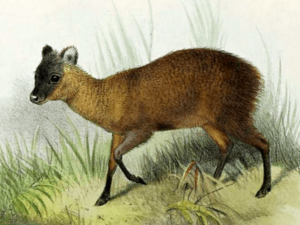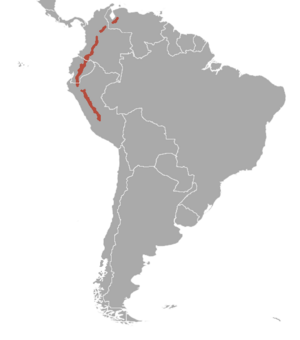Northern pudu facts for kids
Quick facts for kids Northern pudu |
|
|---|---|
 |
|
| Northern pudu (P. mephistophiles) | |
| Conservation status | |
| Scientific classification | |
| Genus: |
Pudella
|
| Species: |
mephistophiles
|
 |
|
| Geographic range of Pudu mephistophiles | |
| Synonyms | |
|
Pudua mephistophiles de Winton, 1896 |
|
The northern pudu (scientific name: Pudella mephistophiles) is a tiny deer from South America. It lives in the Andes mountains in countries like Colombia, Venezuela, Peru, and Ecuador. It's known as the smallest deer on Earth!
Scientists are still learning about this unique animal. Because we don't have enough information about its population, it's listed as "Data Deficient" by the IUCN Red List. This means more research is needed to understand its conservation status. For a long time, it was grouped with the southern pudu. But now, some experts think it belongs in its own special group called Pudella, along with another new species, Pudella carlae.
Meet the Northern Pudu
The northern pudu is truly the smallest deer in the world. It stands only about 32 to 35 cm (13 to 14 in) tall at its shoulder. That's about the height of a ruler!
It weighs between 3.3 to 6 kg (7.3 to 13.2 lb), which is lighter than a small dog. Its antlers are quite short, growing to about 6 cm (2.4 in) long. These antlers curve backward from its head.
The northern pudu's fur is usually lighter in color than its cousin, the southern pudu. However, its face is often darker than the rest of its body.
Where Does the Northern Pudu Live?
The northern pudu lives in the high parts of the Andes mountains. It prefers altitudes from 2,000 to 4,000 m (6,600 to 13,100 ft) above sea level. This is much higher than where its sister species, the southern pudu, lives.
You can find these deer in different areas across the Andes. Their home includes parts of Colombia, Ecuador, and Peru. They live in montane forests, which are mountain forests. They also inhabit high-elevation elfin forests, which are dense, stunted forests found in misty, cool areas.
Sometimes, they live in humid alpine páramo grasslands. These are special grasslands found above the tree-line in the Andes. There's a natural break in their habitat called the Marañón dry forests. This area separates the pudu populations in Ecuador from those in Peru, south of the Marañón River.


